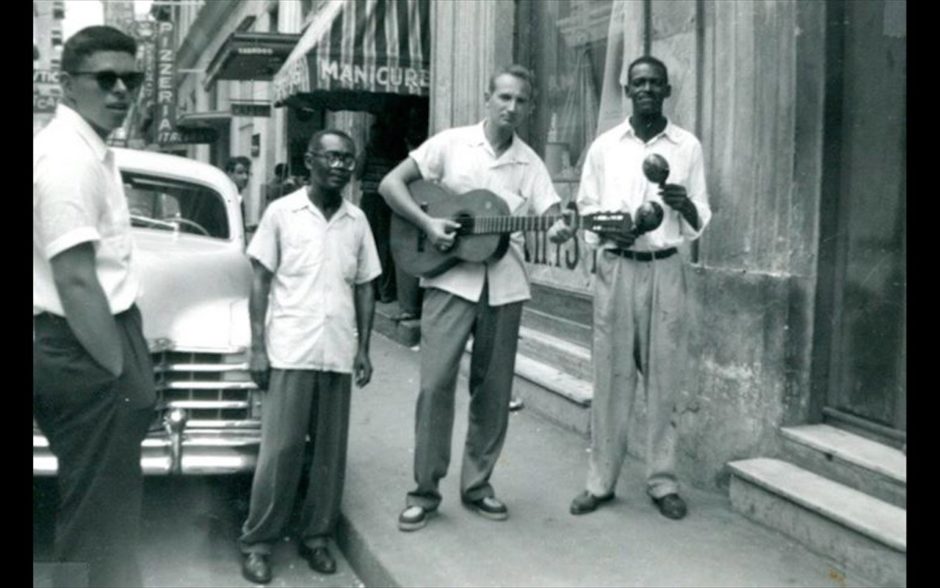Image Caption: Clark Zlotchew, Havana, Cuba, 1958
Editor’s Note: Clark Zlotchew’s poetry will be featured in Irisi Magazine next month. If you’d like to read more of Clark’s work and see what the good folks over at Irisi are doing, please check out their website.
“A Song of China” and “Dancing in the Tropics” published in Irisi Magazine, Copyright (c) 2016 Clark Zlotchew. Used by permission of the author.
A Song of China
It was in Shanghai that I heard it:
Melodious, mellifluous,
It tastes like honey
That flows over your tongue,
Sinks into your taste buds,
Then descends to your stomach,
Where you digest it,
Whence every atom of your being,
Draws it in, absorbs it
The music is so tender,
It caresses,
Like the smooth hand of
A woman who gently strokes
The nape of your neck.
Music that penetrates,
Through your ears,
Into your brain,
Your pores,
Your flesh,
Your blood.
It flows over your heart,
Like a mighty river,
Overwhelming it,
Submerging it,
Drowning it.
It takes hold of your soul,
Tugs on it, threatening
To drag it out of your body.
It’s powerful, yet tender and sweet,
Powerfully tender, powerfully sweet.
It brings tears to your eyes.
Why?
All this emotion dredged up,
By breath whispering through tubes
Of wood, through reeds,
Through silvery metal cylinders?
Perhaps it’s the deep,
Brownish yellow tones,
That taste of fragrant dark honey,
And stream from the wind instrument,
Like air forced through a hollow reed,
Or wind that hums through a bamboo forest,
Or gusts through a ringing cavern,
Or drives dust across a thirsty desert,
A forlorn scene of stark desolation,
A wilderness of dark isolation,
Some God-forsaken windy wasteland.
Perhaps it’s the instrument of one single string,
Stroked with a bow whose silken sounds
Quiver and quake and modulate,
And feel to me like a human cry,
Or perhaps simply a human sigh,
Or the voice of a woman weeping,
In sorrow and despair,
Who has lost something,
Or perhaps someone,
She will never find again.
Perhaps the one, perhaps the other.
Perhaps neither one nor the other.
Just the sound of your very own soul,
As it rises up and out of you,
And flies away with the wind.
Dancing in the Tropics
We sat there, at a table, In Havana,
Softly chatting, till the music
Crashed
Inundated us, submerged us,
Seized us with unseen talons,
With overwhelming intensity,
Towed us out to sea,
In a riptide of rhythm,
A current of melody.
A thunderous pounding of surf
Boomed and burst from deep-voiced drums,
In different pitches, a counterpoint of percussion:
The bat-a-bat of bongos over click of claves,
The boom of the drum called conga,
(Heartbeat of far-off Congo),
Polyrhythmic, sacred batá,
At the approach of the great Changó,
Ah, Bamba-é, Bamba-ó,
Heads bobbing to the throbbing,
Of the thund’ring tumbadora,
Ay, tumba que te tumba,
que te tumba por ahora,
Rumba with the Zumba,
Bruja of Guanabacoa,
Dancing on the beach at Baracoa.
Now, voices singing, voices ringing,
People of the Abakuá invoke Yemayá,
Voices ranting, voices chanting,
Voices bawling, voices calling,
Summoning the mighty Orishas,
From the heavens of the Yoruba,
Transported to fertile Cuba:
Babalú-Ayé, Changó, Ogún,
Obatalá, Yemayá, Ochún,.
Then: strident, acid trumpets,
Razor sharp, in minor key,
Slashed right through the ceremony.
Jerking strum of guitars under sweet stars,
Against the shallow beat of bongos,
The hurried chic-chic of maracas,
And the rasping of the guiro.
The music seized the dancers,
Possessed them with hypnotic rhythms,
Sent them into wild paroxysms,
Beguiled them with haunting melody:
Rhythms of West Africa,
Melodies tasting of Spain,
That tugged upon their chain,
Moved them like a puppet master,
Yanking their strings ever faster.
Guaracha, merengue, mambo,
Rumba, Merecumbé, guaguancó,
Drinking beer marked Hatuey,
They whirled and pranced, wildly danced,
Pushed and dragged into the dance,
By hypnotic beat, into a trance.
But she and I, we lingered longer,
In thrall to rhythms so much deeper,
Carried along by currents stronger,
Held back from the frenzied crowd,
Who slipped and slid to music loud,
A mass of wildly writhing humanity,
In the expression of their Cubanity,
Yet still retaining their Africanity.
She and I moved only to bolero,
Humble, slow dance of the tropics,
Serene, unhurried, tender,
Amorous, romantic, and calm,
In which one and one make only one,
Music created for the two of us,
We gently swayed like royal palms,
To the urging of a tropical breeze,
Entwined among strings of guitar,
Drifting with the nasal tenor,
Who poured forth. loving lyrics,
Like balm on open wounds,
Like melting butter and syrups,
That sweetly flow on cakes of wheat,
Like molasses pressed and blessed
From sultry Cuban cane fields.
* * *
My poetry (5 poems) will appear in Baily’s Beads, literary magazine of U. of Pittsburgh, in January 2017. Three other poems will appear in IRISI in January 2017. My short-story collection, Once Upon a Decade: Tales of the Fifties (Comfort Publishing), was one of three finalists in the Next Generation Indie Book Awards, 2011. Newer stories have appeared in Scrutiny Journal and in Jotters United in 2016, while another story was one of three winners in a contest of Baily’s Beads, and will be published in that journal in January 2017 (with the 5 poems mentioned above). My experience on the high seas and other travels have influenced my writing. My wife and I live in rural Western N.Y. State.
For more of Clark’s work, you can go to his website and on Amazon or check out his work in other literary journals such as Scrutiny Journal, Jotters United and Open Pen.









